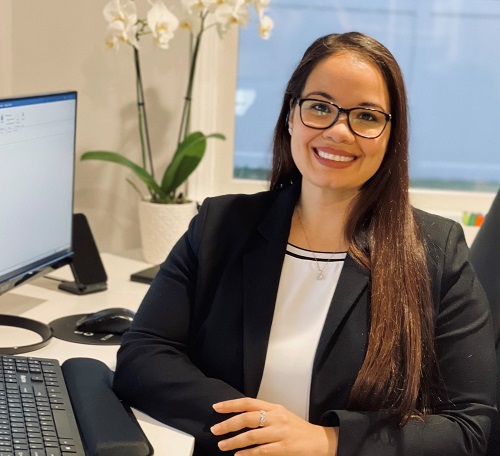Employee Stories
Anny Pena
The new frontier

Anny Pena is the Regional Client Management Head in the Americas, a network committed to raising awareness of the challenges faced by veterans and people with disabilities. Anny tells us about helping veterans transition to a civilian organization, improving access for people with disabilities, and how she’s working to make the Bank as inclusive as possible.
Hi Anny. Tell us your role and how long you’ve been at the bank?
My name is Anny Pena and I’m Managing Director, Regional Head of Client Management for the Americas. I’ve been with Standard Chartered for seven years now.
Before we find out about what led you personally to DRIVEN, can you summarize what it is for us?
DRIVEN stands for Disability Resource Initiative & Veteran Engagement Network. Our focus is on improving the hiring of individuals living with disabilities, as well as veterans, and providing support and resources to staff within both communities while engaging with organizations to find talent in that space.
DRIVEN seems to have a slightly more external focus, how come?
It does. The way I look at it, people living with disabilities have been historically underrepresented in the workplace. There’s a significant opportunity for businesses to target this talent pool; it should be the new frontier for talent acquisition. This talent pool has so much to offer, yet there are a lot of barriers to entry in the disability space. Therefore, we try to open communication between candidates in those communities and hiring managers.
What are some of those barriers to entry?
On the disability side a lot of the challenges are around access. It’s about looking at our facilities, systems and tools and making sure that they are as inclusive as possible. For example, would someone who is visually impaired be able go onto our external hiring site, find a role that they’re qualified for, and apply? And once you have those individuals in the organization, how do we make sure that they have the tools to perform their job to the best of their ability?
A lot of people who come out of the military struggle with translating the skills and experiences they’ve gained from their time in the military into something valuable to a civilian employer. In that space we work both with veterans on things like resume preparation and career coaching, and with our hiring managers to help them understand a veteran’s background and how their experience can be transferrable to civilian employment.
Where can the Bank start making changes to become more inclusive?
Our management team is very supportive and open to suggestions on how we can make the Bank more inclusive. For some changes, the investment is significant so it’s not an easy ask. Other things can be straightforward. A great example is moving away from our current video conferencing provider into Microsoft Teams, which is a more inclusive software, and I think that’s really a step in the right direction.
Tell me about your story. How and why did you first get involved, and what led you to the leadership position of DRIVEN?
I served five years on active duty in the Marine Corps, so I’m a veteran of the US military. When I was transitioning from the military, I was attending Fordham University, and I was recruited by Standard Chartered through their disability and veteran initiative – I was thrilled to have that opportunity. Before that I struggled to connect with private organisations and employers, so I wanted to make sure that we continued the kind of efforts that got me hired into the Bank.
How was your own transition from the military to a ‘regular’ workplace?
I was very lucky to have a mentor at the Bank who was a former Navy Intelligence Officer. He mapped the similarities between what we did in the military and expectations in the civilian sector. It was great to have a mentor who not only understood the organisation but also understood where you’re coming from.
Is there an aspect of DRIVEN’s work that you’re most proud of?
We had an initiative in 2018 to bring neurodiverse talent into the Bank. Mental disability is often invisible and can be very challenging both for the individual who is living with it and for colleagues to understand.
We created an internship for individuals who are on the autism/Asperger’s spectrum. They have abilities such as identifying patterns that a neurotypical person doesn’t have. It’s a strength. And for us to be able to leverage those strengths and find positions where they’re an asset to the business was something that opened the door to looking at disability in a completely different way.
What are your current priorities for DRIVEN?
The pandemic created a shift in the way we work. Remote working is a huge opportunity for people living with a disability as they’re now able to join an organization and perform a job without physically being in a building that perhaps is not accessible. We’re focusing on the technology, making sure that we’re being intentional in hiring, that we have diverse candidates in the pool, and that we update our external site so that individuals with a disability have access.
On the veterans’ side, it’s to continue to partner with community organizations to provide mentoring, coaching and help smooth the transition into civilian employment.